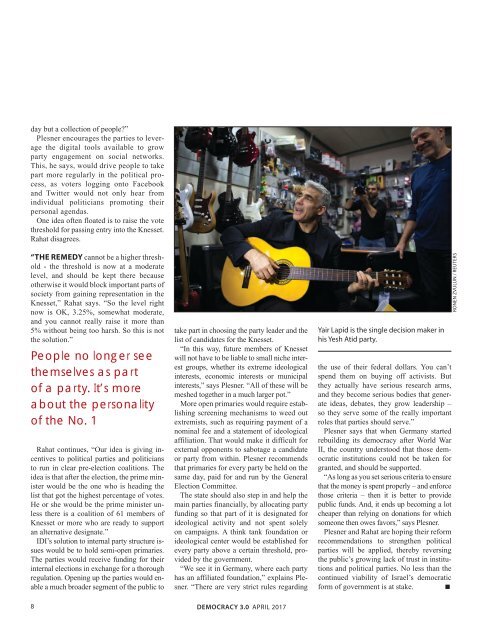הישראלי לדמוקרטיה- מרץ 2017
Create successful ePaper yourself
Turn your PDF publications into a flip-book with our unique Google optimized e-Paper software.
day but a collection of people?”<br />
Plesner encourages the parties to leverage<br />
the digital tools available to grow<br />
party engagement on social networks.<br />
This, he says, would drive people to take<br />
part more regularly in the political process,<br />
as voters logging onto Facebook<br />
and Twitter would not only hear from<br />
individual politicians promoting their<br />
personal agendas.<br />
One idea often floated is to raise the vote<br />
threshold for passing entry into the Knesset.<br />
Rahat disagrees.<br />
“THE REMEDY cannot be a higher threshold<br />
- the threshold is now at a moderate<br />
level, and should be kept there because<br />
otherwise it would block important parts of<br />
society from gaining representation in the<br />
Knesset,” Rahat says. “So the level right<br />
now is OK, 3.25%, somewhat moderate,<br />
and you cannot really raise it more than<br />
5% without being too harsh. So this is not<br />
the solution.”<br />
People no longer see<br />
themselves as part<br />
of a party. It’s more<br />
about the personality<br />
of the No. 1<br />
Rahat continues, “Our idea is giving incentives<br />
to political parties and politicians<br />
to run in clear pre-election coalitions. The<br />
idea is that after the election, the prime minister<br />
would be the one who is heading the<br />
list that got the highest percentage of votes.<br />
He or she would be the prime minister unless<br />
there is a coalition of 61 members of<br />
Knesset or more who are ready to support<br />
an alternative designate.”<br />
IDI’s solution to internal party structure issues<br />
would be to hold semi-open primaries.<br />
The parties would receive funding for their<br />
internal elections in exchange for a thorough<br />
regulation. Opening up the parties would enable<br />
a much broader segment of the public to<br />
take part in choosing the party leader and the<br />
list of candidates for the Knesset.<br />
“In this way, future members of Knesset<br />
will not have to be liable to small niche interest<br />
groups, whether its extreme ideological<br />
interests, economic interests or municipal<br />
interests,” says Plesner. “All of these will be<br />
meshed together in a much larger pot.”<br />
More open primaries would require establishing<br />
screening mechanisms to weed out<br />
extremists, such as requiring payment of a<br />
nominal fee and a statement of ideological<br />
affiliation. That would make it difficult for<br />
external opponents to sabotage a candidate<br />
or party from within. Plesner recommends<br />
that primaries for every party be held on the<br />
same day, paid for and run by the General<br />
Election Committee.<br />
The state should also step in and help the<br />
main parties financially, by allocating party<br />
funding so that part of it is designated for<br />
ideological activity and not spent solely<br />
on campaigns. A think tank foundation or<br />
ideological center would be established for<br />
every party above a certain threshold, provided<br />
by the government.<br />
“We see it in Germany, where each party<br />
has an affiliated foundation,” explains Plesner.<br />
“There are very strict rules regarding<br />
Yair Lapid is the single decision maker in<br />
his Yesh Atid party.<br />
the use of their federal dollars. You can’t<br />
spend them on buying off activists. But<br />
they actually have serious research arms,<br />
and they become serious bodies that generate<br />
ideas, debates, they grow leadership –<br />
so they serve some of the really important<br />
roles that parties should serve.”<br />
Plesner says that when Germany started<br />
rebuilding its democracy after World War<br />
II, the country understood that those democratic<br />
institutions could not be taken for<br />
granted, and should be supported.<br />
“As long as you set serious criteria to ensure<br />
that the money is spent properly – and enforce<br />
those criteria – then it is better to provide<br />
public funds. And, it ends up becoming a lot<br />
cheaper than relying on donations for which<br />
someone then owes favors,” says Plesner.<br />
Plesner and Rahat are hoping their reform<br />
recommendations to strengthen political<br />
parties will be applied, thereby reversing<br />
the public’s growing lack of trust in institutions<br />
and political parties. No less than the<br />
continued viability of Israel’s democratic<br />
form of government is at stake. <br />
RONEN ZVULUN / REUTERS<br />
8 DEMOCRACY 3.0 APRIL <strong>2017</strong>


